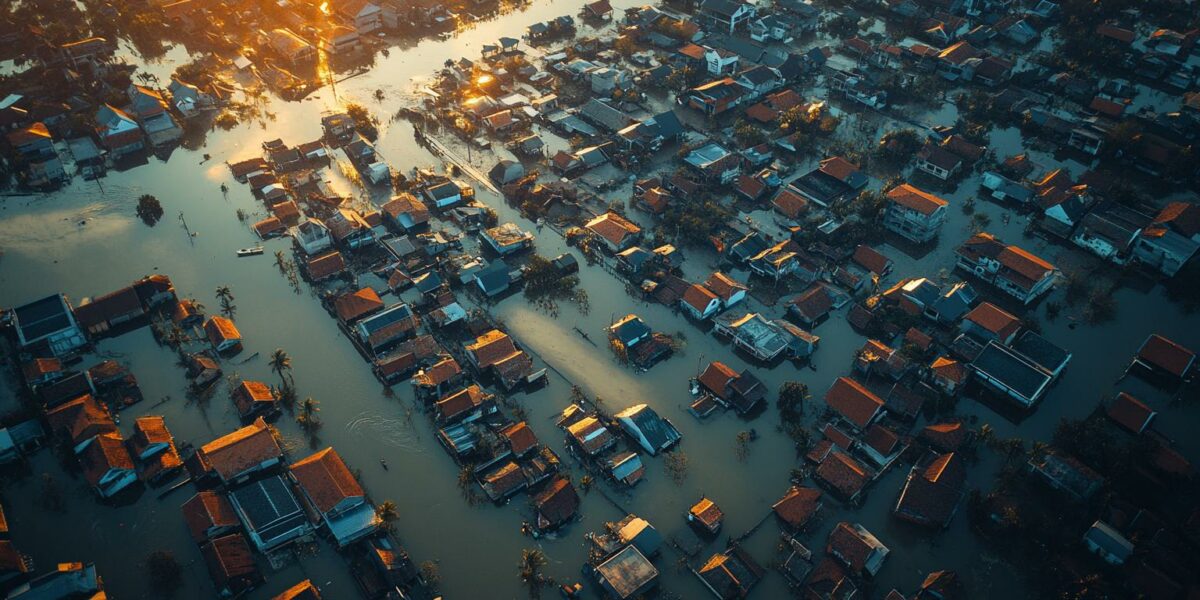Pakistan’s 2022 Floods: A Global Wake-Up Call
The catastrophic 2022 floods in Pakistan serve as a stark reminder of the global nature of climate change. This disaster resulted in the tragic loss of over 1,700 lives and displaced more than 30 million people. Such events underscore the urgent need for global climate action, transcending national boundaries.
UN Secretary General Guterres highlighted that Pakistan contributes less than 1% to global emissions, yet suffers disproportionately. This disparity calls for immediate global cooperation and accountability from the biggest polluters. It’s a clear message: our collective actions have far-reaching consequences.
The international response included the establishment of a climate damage fund at COP27. This fund aims to support countries like Pakistan that are severely affected by climate-induced disasters. The commitment from richer nations is a step towards climate justice and equitable burden-sharing.
As we witness these devastating impacts, it’s crucial to recognize that every positive step we take towards reducing emissions contributes to the well-being of vulnerable populations worldwide. Our local actions have global ramifications, emphasizing the interconnectedness of our environment.
Global Disparities in Climate Impact
The disparity in climate impacts between developed and developing nations is stark. While developed countries have the resources to adapt and mitigate, developing nations often bear the brunt of climate disasters. This inequity demands a reevaluation of global climate policies and support systems.
At COP27, the debate centered around who should bear the financial burden of climate-induced damages. The agreement to create a climate damage fund was a significant achievement. However, the effectiveness of this fund will depend on the commitment and contributions from the wealthiest nations.
Addressing climate change requires a multi-faceted approach:
- Reducing greenhouse gas emissions globally
- Investing in renewable energy sources
- Providing financial aid to vulnerable countries
These steps, combined with strong international cooperation, can help mitigate the adverse effects of climate change and promote a more sustainable future for all nations.
The Role of Fossil Fuels in Climate Change
The fossil fuel industry remains a significant contributor to global emissions. Despite numerous warnings and scientific evidence, new drilling projects continue to emerge. The call from the UN to halt all new drilling is a critical step towards reducing our carbon footprint.
Transitioning to renewable energy sources is essential. Solar, wind, and hydroelectric power offer sustainable alternatives that can significantly reduce our reliance on fossil fuels. This transition not only benefits the environment but also creates new economic opportunities.
Countries must prioritize policies that incentivize renewable energy adoption. Investments in research and development can accelerate technological advancements, making clean energy more accessible and affordable.
Public awareness and education are also crucial. By understanding the impact of fossil fuels on climate change, individuals can make informed choices that contribute to a greener planet. Collective action at both the governmental and individual levels is necessary to drive meaningful change.
Personal and Community Responsibility
While global policies and agreements are vital, individual actions play a significant role in combating climate change. Simple lifestyle changes, such as reducing energy consumption and supporting sustainable products, can collectively make a substantial difference.
Communities can also drive change by advocating for local environmental initiatives. Grassroots movements and community-based projects can lead to significant environmental improvements and inspire broader societal shifts.
Education and awareness programs are essential in fostering a culture of environmental responsibility. Schools, organizations, and media can play a pivotal role in spreading knowledge and encouraging sustainable practices.
Ultimately, addressing climate change requires a collaborative effort from all sectors of society. By working together, we can create a resilient and sustainable future for generations to come. The time to act is now.



skylarjourney
Can local communities really make that much of a difference in combating climate change?
WyattSymphony
Great article! But do you think richer nations will actually follow through with their commitments?
muffin_midnight
More than 30 million people displaced? This is absolutely heartbreaking. 😢
cameroncelestial
How exactly will the climate damage fund be distributed among affected countries?
KevinEcho
It’s high time we all switch to renewable energy sources. Fossil fuels are outdated!
Josiah
Thank you for highlighting this critical issue! 🌍
ameliacatalyst8
Why do developed countries not take more responsibility for these climate disasters?